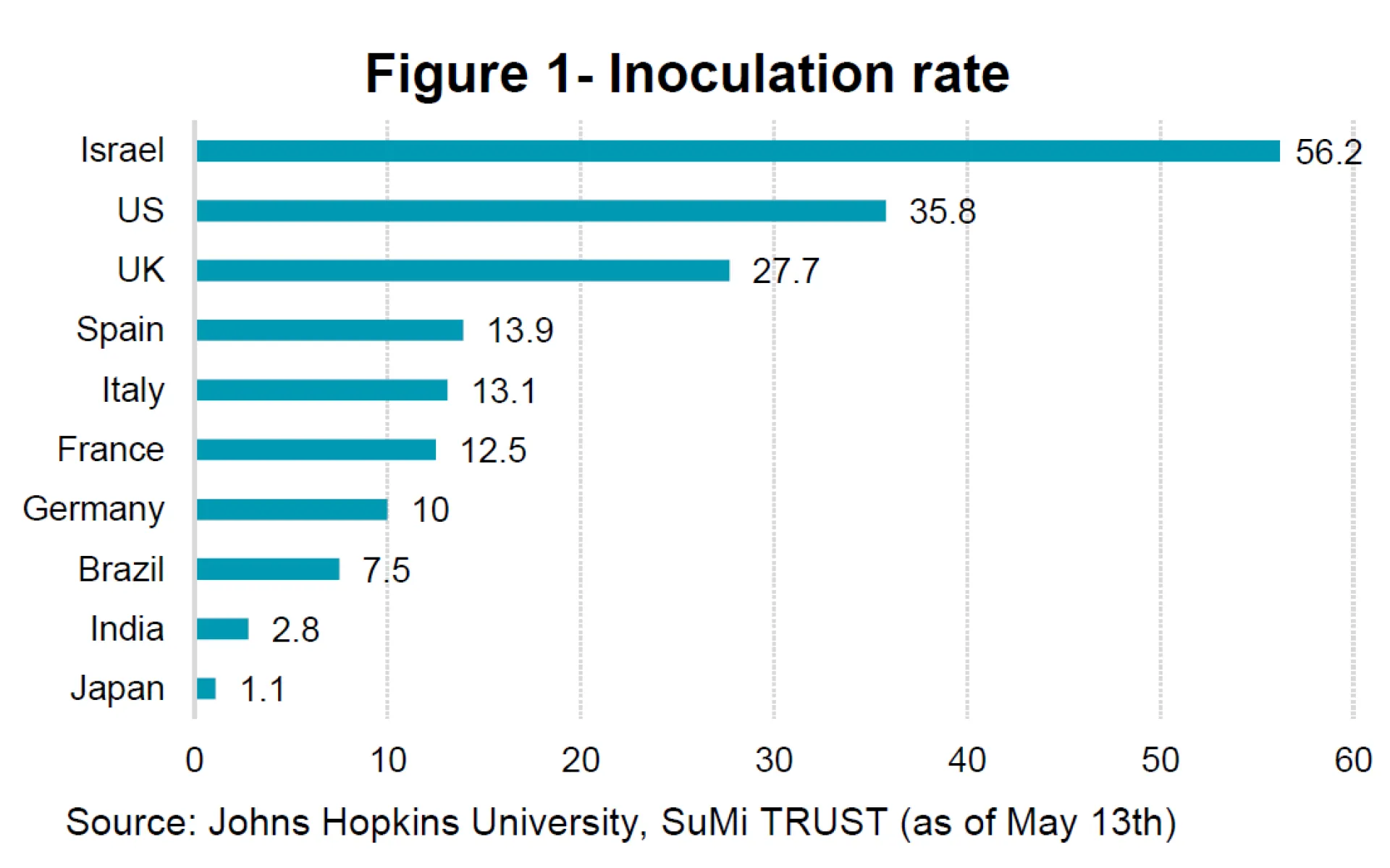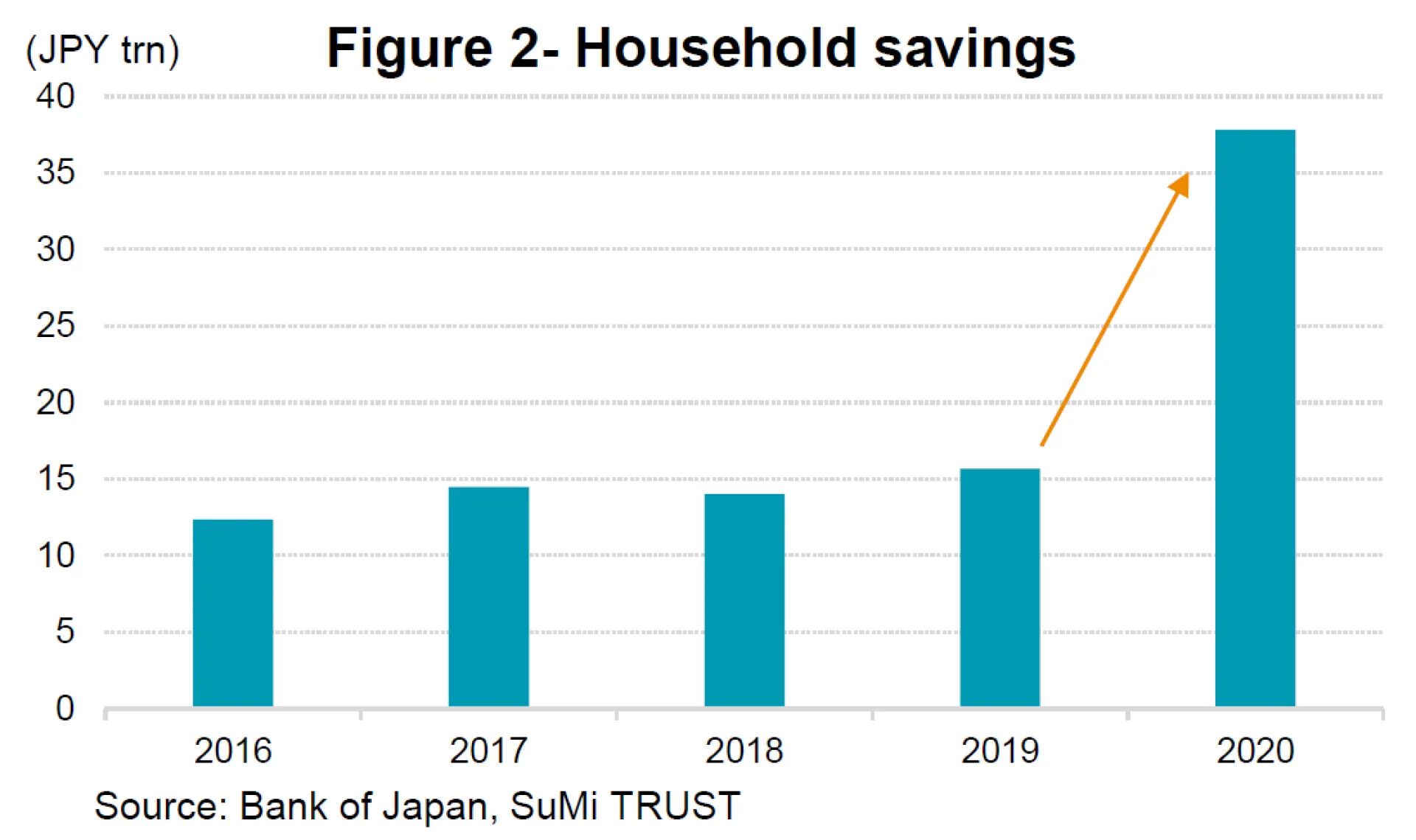1. Current Status of Vaccinations in Japan
Japan has seen the biggest delay in the roll out of vaccines among the major nations of the world. Specifically, as of May 13th, 2021, the vaccination rate in Japan was 1.1% (Figure 1). In Japan, vaccination of medical personnel began in February, and vaccination for the elderly (i.e. 65 years old and over) began in April, but it is still only midway through the vaccination process and it remains unclear when the general public will be vaccinated. Why has Japan, the world's third-largest economy, fallen behind in the vaccination process?

Firstly, the approval process of vaccines by the Ministry of Health, Labor and Welfare has been slow. The Pfizer vaccine, which was approved in the United States in December of last year, was approved belatedly in Japan in February, and is the only approved vaccine in Japan as of May 13th. For this reason, the amount of vaccines currently available on the market is not sufficient (The total amount of vaccines secured through contracts with US and British pharmaceutical companies is sufficient.). In addition to the Pfizer vaccine, AstraZeneca's vaccine filed for application in February, and Moderna's vaccine made its application in March. Both should receive a verdict in May (Moderna is reportedly likely to be approved). The Ministry of Health, Labor and Welfare is proceeding with its examinations of the drugs based on data from overseas clinical trials, but it takes time due to strict regulations on the effectiveness and safety of drugs and a rigid bureaucracy that is unwilling to temporarily relax the rules. Japanese pharmaceutical companies are also developing their own vaccines, but development has been delayed due to regulations that require large-scale clinical trials.
Secondly, Japan does not have a database that can efficiently and comprehensively manage and monitor the vaccination status, and cannot build a digital management system. Japan has fallen behind in the digitization of medical information. From around 2010, the Japanese government had been promoting the Japanese version of the EHR (Electronic Health Record), which aims to electronically record national health records and share them among medical institutions. However, because the burden on medical institutions is heavy and the responsibility of personal information protection is not clear, the database is not widely used among the nation (Note that the delay in digitization is not limited to medical services, but also in all the public sectors. Due to the lack of appropriate database, the payment of subsidies as a counter measurement of COVID-19 has been significantly delayed).
On the other hand, Israel, the country with the highest vaccination rate, has built a system for efficient inoculation by utilizing a sophisticated medical database. Israeli citizens are obliged to take out health insurance, and patient data, such as medical history, is managed according to an identification number and stored in a database. Using this database, a system for efficient vaccination has been established, prioritizing people with the greatest need for the vaccination.
Third, Japan lacks people to administer the vaccine. Vaccine injections were only allowed by doctors and nurses in Japan, and dentists and pharmacists were not permitted to administer vaccinations. In the US and UK, even pharmacists can administer the vaccines, broadening the base of personnel to administer inoculations through temporary measures, and the pace of inoculation was accelerated.
In Japan, there are many beds at hospitals under the universal health insurance system, and access to medical care was very good in normal times. But the system has lacked flexibility due to a highly regulated industry. In addition to the example of authorized people who can administer the inoculations, COVID-19 is a designated infectious disease (equivalent to Class 2), and as such, the beds in a normal hospital ward cannot be used. Hospitals are also reluctant to make capital investments as accepting COVID-19 patients has not been profitable. Such inflexibility by both governments and hospitals have exacerbated the situation.
2. Outlook for Vaccinations in Japan
Recently, the Japanese government, feeling a sense of crisis and urgency about the lack of progress in administering the vaccinations, has begun to take various measures. Firstly, on April 17th, during his visit to the US, Prime Minister Suga had a call with Pfizer CEO Albert Bourla to request an additional supply of vaccines, specifically 50 million new coronavirus vaccines (for 25 million people). The new supply is expected to arrive by the end of September. As a result of supplies from two companies, Pfizer and Moderna, Japan will have secured the necessary vaccines for nations over 16 years old eligible for the vaccine (or about 110 million people) by the end of September (As cases of thrombotic symptoms appearing after the inoculation are reported for AstraZeneca vaccine, there was a risk that the vaccine could not be fully administered to nations over 16 years).
Attempts have also begun to broaden the base of people who can administer the vaccine. At the end of April, the Ministry of Health, Labor and Welfare notified the local government that dentists are also allowed to administer vaccines. Currently, the government is also considering allowing pharmacists to administer injections. These are major steps forward.
In addition, in order to accelerate inoculations roll out, large-scale vaccination centers are scheduled to open simultaneously in Tokyo and Osaka on May 24th. Further, to secure the necessary personnel, the Ministry of Defense is convening doctors and nurses in the Self Defense Force nationwide, to expedite the process.
Moreover, Prime Minister Suga has announced that vaccinations for the elderly will be complete by the end of July and that inoculations will start for the general public. The goal is to have 1 million inoculations a day, and if achieved, the majority of the population will have been inoculated by the end of the year. In other words, Japan will acquire herd immunity. Although it is uncertain whether the vaccinations will proceed as scheduled, it is expected that the vaccinations would be provided to the general public in the latter half of the year.
3. Implications for the Economy
Given the delay in vaccinations under the background mentioned above, and with medical facilities overwhelmed due to the lack of beds for COVID-19 patients, we may see repeated state of emergency declarations in the short term until the vaccine reach out to the masses. While the world economy is recovering, especially in the US, where vaccinations have progressed rapidly, and China, which has succeeded in controlling COVID-19 at an early stage, we expect economic activity in Japan will be led by external demand, and that domestic demand (especially interpersonal service consumption) will continue to face difficulty. We believe that domestic demand- related stocks will underperform external demand-related stocks.
On the other hand, in the medium term, given that household savings have increased significantly due to COVID- 19, we believe that “revenge” consumption should be seen as the vaccines become available to the masses and that a rapid recovery in domestic demand should be expected. In 2020, household savings were 38 trillion yen, a 2.4-fold increase from the previous year (Figure 2). With COVID-19, consumption had decreased significantly, mainly in face-to-face services, and various government handouts, such as special fixed-amount benefits, have also contributed to the increase in savings. Since the potential for “revenge” consumption is expected to be large, there should be a rapid reversal in the performance of domestic demand stocks such as those related to personal consumption just as vaccines spread to the general public (We assume around 4Q of this year).
In addition, the delay in vaccinations and the payment of various benefits has increased the momentum for digitization of the government which many believe is essential. The government is planning to launch a Digital Agency in September 2021, and in the long run, it is expected that the central government, local governments, and the private sector will work together to build an IT platform. In Japan, the My Number Card, which has been issued to every citizen and has a unique ID, has not yet been effectively used in government. In the future, we believe that this My Number Card will be actively promoted not only for use by government agencies but also for private sector use such as financial settlements and medical use (In fact, the My Number Card is being used as a partial substitute for health insurance cards from March 2021 and is expected to be fully functional from around October of this year). Demand for information systems and IT companies is expected to continue in the long term, and there will be many opportunities to gain alpha in Japan equity market.

